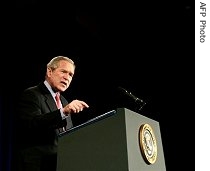-
(单词翻译:双击或拖选)
White House
15 February 2007
President Bush says the United States and NATO will stage a spring offensive in Afghanistan against terrorists and Taleban fighters. VOA's Paula Wolfson reports from the White House.
 |
| President Bush speaks on the Global War on Terrorism at the Mayflower Hotel in Washington, 15 Feb 2007 |
"The Taleban and al-Qaida are preparing to launch new attacks," he said. "Our strategy is not to go on the defense2, but to go on the offense3. This spring, there is going to be a new offensive in Afghanistan, and it is going to be a NATO offensive."
He says the effort will take extra troops and resources, and he urges all NATO allies to help. He also calls on some members of the alliance to lift conditions restricting their forces to relatively4 safe areas.
"Allies must lift restrictions5 on the forces they do provide, so NATO commanders have the flexibility6 they need to defeat the enemy, wherever the enemy may make a stand," he said.
The United States pressured NATO allies during a defense ministers meeting in Spain earlier this month to provide more troops for Afghanistan. But several European allies say there is too much emphasis on a military solution.
Mr. Bush says the United States is doing its part.
"I have ordered an increase of U.S. forces in Afghanistan," said President Bush. "We have extended the stay of 3,200 now in the country for four months, and will deploy7 a replacement8 force that will sustain this increase for the foreseeable future."
In a speech to the American Enterprise Institute, a private policy research group, the president said the war in Afghanistan does not get as much attention in the United States as the conflict in Iraq. But he said it is important to remember that just five years ago, the Afghan people were living in, what he called, a totalitarian nightmare.
He said progress is being made, citing the election of a democratic government, the creation of new opportunities for the Afghan people, and the construction of roads and other infrastructure9 in a country bearing heavy scars of war.
Mr. Bush said attacks escalated10 in 2006, making it the toughest year since the Taleban were driven from power by U.S.-led forces. But, he said, NATO is helping11 the Afghan people, by training Afghan security forces, improving its intelligence capability12, and bringing much needed services to the provinces.
"Our commitment is strong," he said. "We will train you, we will help you and we will stand with you as you defend your new democracy."
The president also brought up relations between Afghanistan and neighboring Pakistan, and stressed they must work together to halt the violence and stop extremists from launching attacks from their common border. He said he will stay in constant contact with Afghan and Pakistani leaders to remind them of their obligations.
 收听单词发音
收听单词发音
1
thaw

|
|
| v.(使)融化,(使)变得友善;n.融化,缓和 | |
参考例句: |
|
|
|
2
defense

|
|
| n.防御,保卫;[pl.]防务工事;辩护,答辩 | |
参考例句: |
|
|
|
3
offense

|
|
| n.犯规,违法行为;冒犯,得罪 | |
参考例句: |
|
|
|
4
relatively

|
|
| adv.比较...地,相对地 | |
参考例句: |
|
|
|
5
restrictions

|
|
| 约束( restriction的名词复数 ); 管制; 制约因素; 带限制性的条件(或规则) | |
参考例句: |
|
|
|
6
flexibility

|
|
| n.柔韧性,弹性,(光的)折射性,灵活性 | |
参考例句: |
|
|
|
7
deploy

|
|
| v.(军)散开成战斗队形,布置,展开 | |
参考例句: |
|
|
|
8
replacement

|
|
| n.取代,替换,交换;替代品,代用品 | |
参考例句: |
|
|
|
9
infrastructure

|
|
| n.下部构造,下部组织,基础结构,基础设施 | |
参考例句: |
|
|
|
10
escalated

|
|
| v.(使)逐步升级( escalate的过去式和过去分词 );(使)逐步扩大;(使)更高;(使)更大 | |
参考例句: |
|
|
|
11
helping

|
|
| n.食物的一份&adj.帮助人的,辅助的 | |
参考例句: |
|
|
|
12
capability

|
|
| n.能力;才能;(pl)可发展的能力或特性等 | |
参考例句: |
|
|
|















